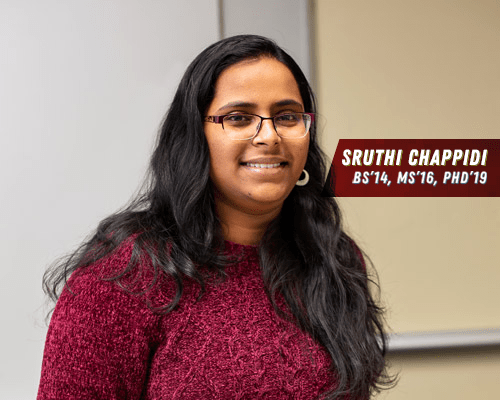Class of 2019 Interview with Sruthi Chappidi: PhD Lights Way for Women To Pursue Computer Science

As the only girl in her high school computer science class, Sruthi Chappidi BS’14, MS’16 felt like she didn’t belong.
As a result, she decided to major in biology when she enrolled in The University of Texas at Dallas, with a minor in computer science. After taking several computer science courses, Chappidi chose to earn a master’s degree and a PhD in software engineering from the Erik Jonsson School of Engineering and Computer Science. Next, she will use her expertise in bioinformatics, which uses computer science to analyze biological data, as a postdoctoral researcher at UT Southwestern Medical Center.
Chappidi said she hopes her unexpected path will show other women that they, too, can have a place in computer science. Fewer than 19% of bachelor’s degrees in computer science are awarded to women, according to the National Science Foundation. Chappidi has served as a leader in the UT Dallas student organization Women Who Compute to mentor and support female computer science students and spread the word that computer science is “not scary.” She encourages anyone with an interest in the subject to take a few classes, and if they like it, to keep going.
“My motto is never give up,” Chappidi said. “Keep working hard toward the goal and have a never-give-up attitude.”
What will you miss most about UTD?
I am going to miss my friends, amazing mentors and faculty with whom I had the opportunity to meet and work. Most importantly, I will miss being part of the Women Who Compute organization, which I have been involved with since its inception.
Would you rather have to retake a final exam or be Temoc for a day?
I have never been Temoc for a day, but I have taken a lot of final exams. So, maybe Temoc, to get a new experience.
What is a fun fact about you?
My friends tell me that there are times on the night before an exam or an important presentation that I have recited the information I studied while sleeping.
What are the best ways to survive a Monday?
Lots of coffee, working out and prepare for Monday the week before.
What’s the most Instagrammable spot on campus?
With the impressive growth of UTD, there are a lot of Instagrammable spots, like the Plinth and the main entrance between the Visitor Center and the Naveen Jindal School of Management. I really like the Love Jack in the courtyard of the Edith O’Donnell Arts and Technology Building.
What’s the first thing you’ll do to celebrate your graduation?
A road trip, which has been on hold for a while.
What accomplishment/project are you most proud of from your time at UTD?
Taking up a new field of study, which is totally different from my undergraduate degree, to earn a PhD in software engineering.
UT Dallas alumni make their mark wherever they go. How will you make yours?
With the experience and training I gained through faculty and collaborators that I worked with at UT Dallas, I would like to continue research in the field of bioinformatics in bridging the gap between computer science and biological sciences.
Editor’s Note: Every Comet follows a distinct path to UT Dallas, and members of the Class of 2019 are no exception. A few soon-to-be fall graduates shared their thoughts about their journeys as they get ready to tackle new challenges after commencement.
Source | UT Dallas News Center | Kim Horner
ABOUT THE UT DALLAS COMPUTER SCIENCE DEPARTMENT
The UT Dallas Computer Science program is one of the largest Computer Science departments in the United States with over 3,315 bachelors-degree students, more than 1,110 master’s students, 165 Ph.D. students, 52 tenure-track faculty members, and 44 full-time senior lecturers, as of Fall 2019. With The University of Texas at Dallas’ unique history of starting as a graduate institution first, the CS Department is built on a legacy of valuing innovative research and providing advanced training for software engineers and computer scientists.




